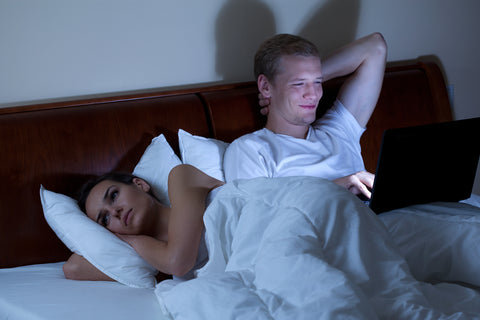40% of Americans don’t get enough sleep according to a statistic in 2013.
It was said in 2011 that 45% of the world’s population is affected by a sleeping disorder.
How bad is it really to not sleep enough?

How well you sleep, rather than how often you have sex, is a key factor to happy relationships.
Lack of sleep can lead to increased risk for automobile accidents, heart disease, heart attack, heart failure, high blood pressure, and diabetes, it can also hurt your cognitive process by dumbing you down, kill your sex drive, cause depression, age your skin, make you forgetful, cause weight gain, and more.
It is easy to think that in our fast-paced 24/7 society that sleep is not a priority. However, according to science, sleep should be even more important than eating since you would die from sleep deprivation before starving. It takes 2 weeks to starve and only 10 days without sleep would kill you.
When you sleep your body recharges, cells repair themselves, body releases important hormones like melatonin that help regulate sleeping patterns.
There are studies that show that melatonin can help fight cancer, ward off other diseases such as Alzheimer’s, and even reduce migraines. Melatonin is only can only be released in the darkness as light acts as an inhibitor. Light exposure at night that continually disrupts melatonin secretion in the long-term can even be linked to cause cancer.
Why are so many people struggling to sleep?
“It is time to reassess the early assurances of Thomas Edison that using electric light ‘is in no way harmful to health, nor does it affect the soundness of sleep.'”–Charles Czeisler, Ph.D., professor of sleep medicine at Harvard Medical School
Unfortunately for us, artificial light from electronics such as laptops, tablets, and cell phones fall into the light category that trick the brain into thinking that it is still daytime and signal to hold off on the melatonin. This throws off our biological clocks, makes it more difficult to fall asleep, and have hinders quality sleep. Some professors say that you should turn off these devices 2 hours before falling asleep to reduce the impact of the light and replace the artificial blue-enriched light with red-enriched light after the sun sets.
Those especially affected by this problem are children and young adults who need more sleep and the ability to focus on academics. Many use their electronic devices late into the night which puts them at an increased risk for anxiety disorders, depression, substance abuse, diabetes, and more.
Do you get enough sleep?
Do you use your phone or other electronic device before bed?
What else do you do to improve sleep habits?
Share your thoughts in the comment section below!
You may also be interested in…
- Cell Phones–An Unhealthy Obsession
- Are Robot Conspiracies Telling the Truth?
- 10 Easy Ways to Reduce Mobile Radiation

